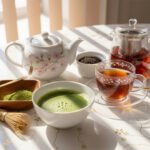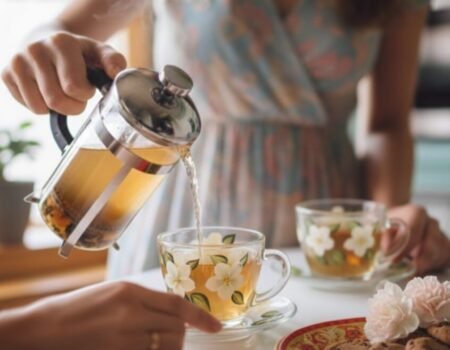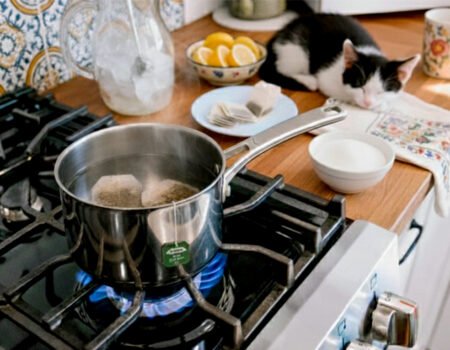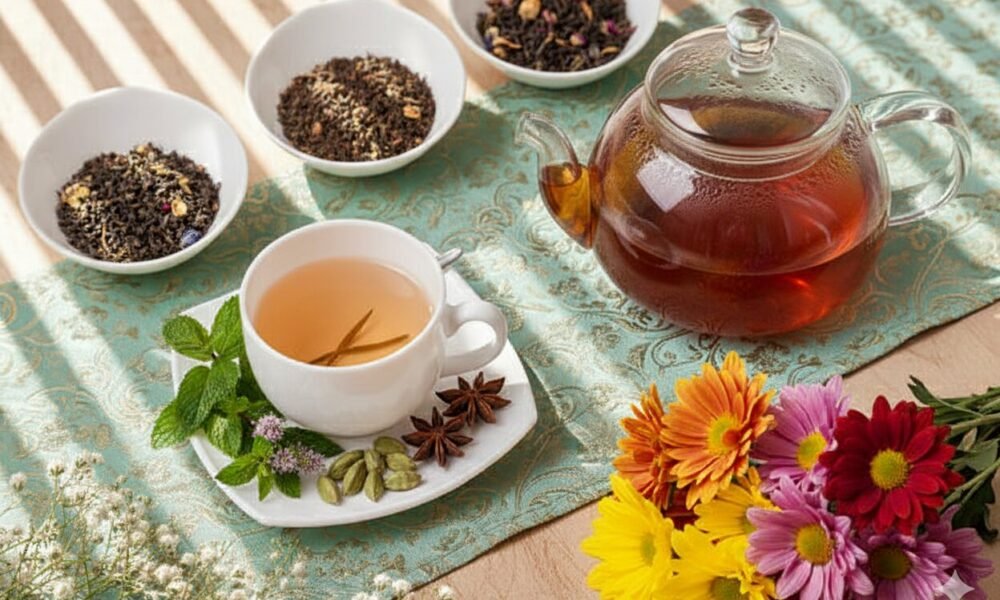
What Types of Tea Are Sweet: A Guide to Deliciously Sweet Tea Varieties
Index
Many tea lovers want natural sweetness without extra calories. Finding what types of tea are sweet without added sugar can be tricky.
Most store-bought sweet teas have added sugar that mask the true flavors of quality leaves.
Tea gardens around the world grow varieties that offer natural sweetness. Herbal teas like rooibos and honeybush deliver gentle sweet notes perfect for evening sipping.
In this guide, we’ll explore naturally sweet black teas, oolongs, and herbal blends that satisfy your sweet tooth without artificial sweeteners. These alternatives to sugary drinks will transform your tea experience.
Key Takeaways
- Rooibos and honeybush teas offer natural sweetness without caffeine, making them perfect evening options for those with a sweet tooth.
- Black teas like Osmanthus Black and Assam Milk Tea provide natural sweetness with robust flavor profiles.
- Dessert-inspired teas such as Chocolate Mint Oolong and Strawberry Truffle Puerh satisfy sweet cravings without added sugar.
- Natural sweeteners like honey and maple syrup can enhance tea’s sweetness, while adding fruits or spices creates complementary flavor profiles without refined sugar.
Naturally Sweet Teas
Some teas offer natural sweetness without added sugar. These sweet varieties range from floral herbal blends to rich black teas with caramel notes.
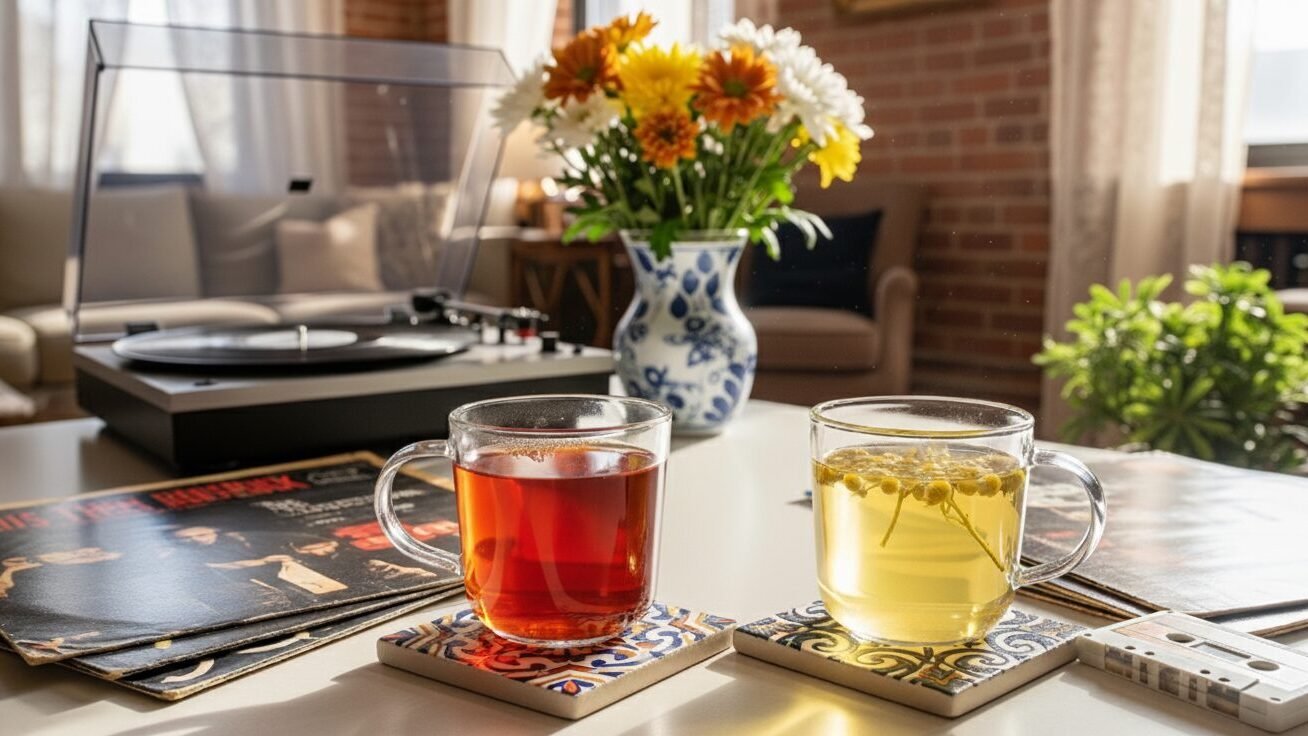
Herbal Teas: Rooibos, Chamomile, and Honeybush
Rooibos tea stands out among our caffeine-free options with its naturally sweet flavor profile. This South African brew requires no added sugar to deliver a pleasant taste that many tea lovers enjoy.
The rich amber liquid offers a smooth, slightly nutty flavor that makes it perfect for both hot tea and iced tea versions. Rooibos serves as an excellent alternative to sugary sodas while still satisfying sweet cravings.
Honeybush tea shares many traits with its cousin rooibos, including a natural sweetness and zero caffeine content. The flavor hints at honey and dried fruits, creating a soothing drink for any time of day.
Chamomile, another popular single-ingredient option brings a mild apple-like sweetness that calms the senses. These naturally sweet teas provide health benefits without the need for artificial sweeteners, making them smart choices for daily drinking.
Black Teas: Osmanthus Black, Assam Milk Tea
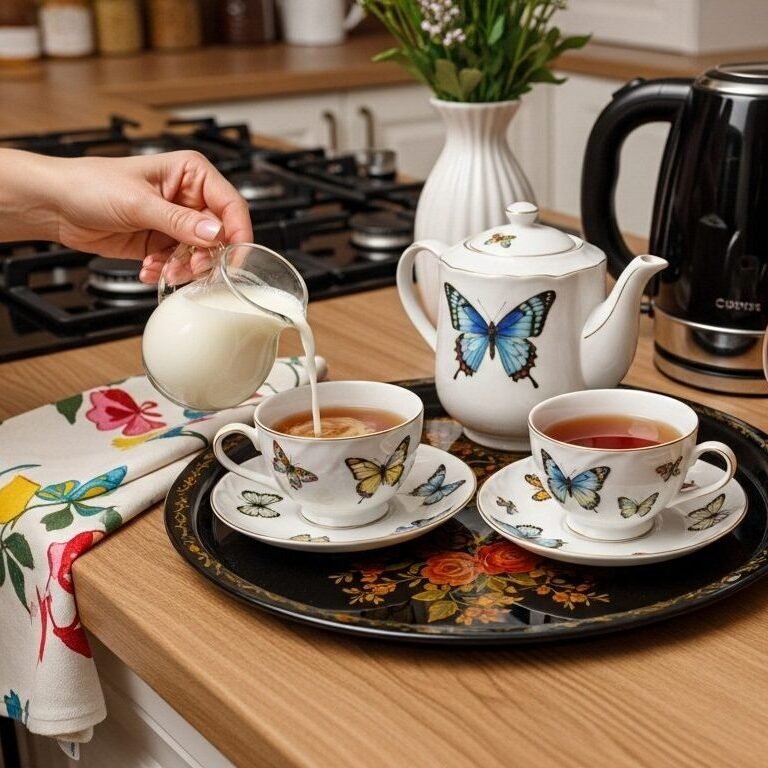
Black teas offer some of the sweetest natural flavors in the tea world. Osmanthus Black tea blends traditional black tea with sweet osmanthus flowers, creating a honey-like taste that needs no added sugar.
The floral notes mix perfectly with the robust black tea base, giving you a cup that balances sweetness with depth. Many tea fans enjoy this variety both hot and iced, as the natural sweetness shines through at any temperature.
Assam Milk Tea stands out as a premium sweet option as this fully oxidized tea delivers a naturally sweet, malty flavor profile.
The rich taste pairs beautifully with milk, which enhances its inherent sweetness. Assam contains moderate to high caffeine content, making it an excellent morning choice for those who want both energy and sweet satisfaction without artificial additives.
Green Teas: Jasmine Green, Genmaicha
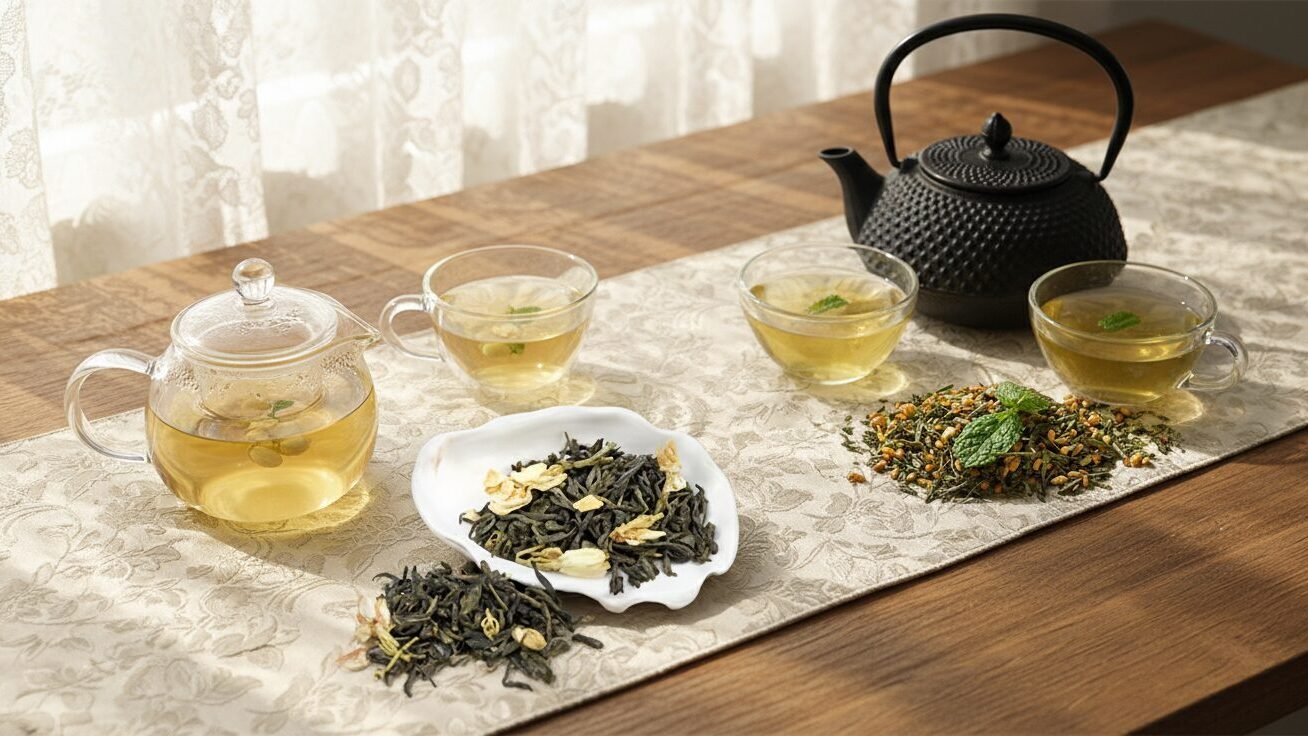
Green teas offer sweet options for tea lovers seeking natural flavor without added sugar. Jasmine Green tea blends delicate green tea leaves with jasmine flowers, creating a sweet floral taste that soothes the palate.
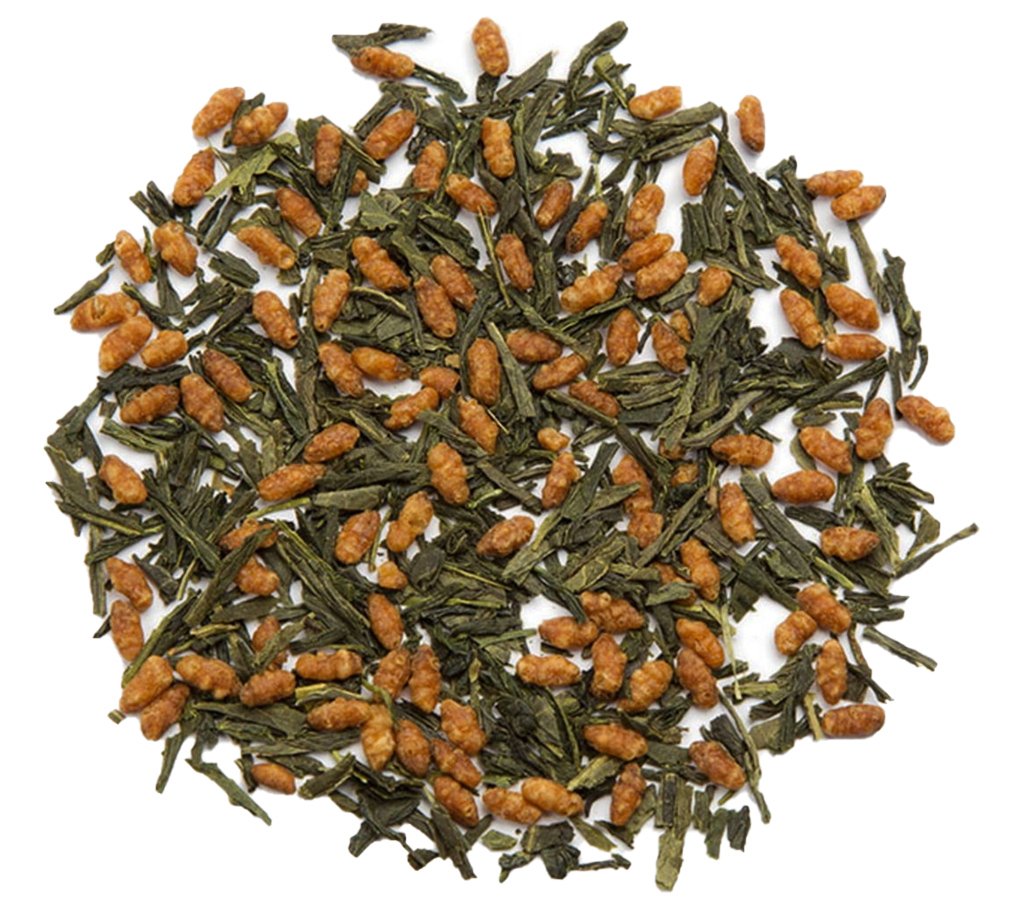
The natural sweetness comes from the jasmine essence that infuses the tea during processing, making it a popular choice for hot tea enthusiasts.
Genmaicha presents a unique sweet profile by combining Sencha green tea with roasted brown rice. This Japanese green tea delivers a sweet and earthy flavor that many find naturally pleasing.
The toasted rice adds a nutty sweetness that balances the grassy notes of the Sencha, making Genmaicha an excellent introduction for those new to Japanese green tea varieties. The Camellia sinensis plant used in these teas contains natural compounds that contribute to their subtle sweetness.
ROOIBOS ROCKS Organic Rooibos Tea
Genuinely sweet without sugar, and forgiving enough that you won't ruin it by oversteeping.
Rooibos from South Africa's Cederberg region delivers natural sweetness without any added sugar—a genuine alternative for those cutting back on sweetened beverages. This organic version earns praise for its silky, never-bitter character even when steeped longer than recommended, making it forgiving if you get distracted.
⚠️ Skip this if you enjoy getting multiple steeps from your tea—rooibos generally gives its best on the first infusion and fades quickly after.
Types of Herbal Tea
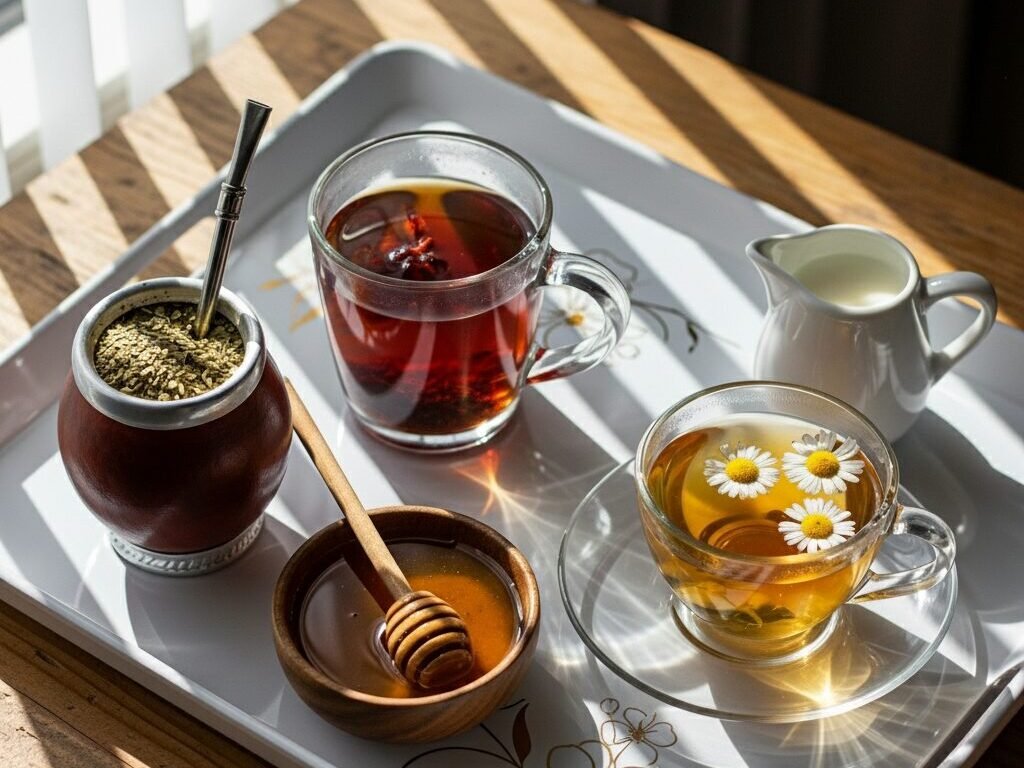
Herbal teas offer a wonderful range of caffeine-free options that come from various plant parts rather than the traditional tea plant. These soothing brews fall into three main categories based on their source: flower-based, leaf-based, and root-based infusions.
Flower herbal teas include the popular chamomile with its apple-like taste and hibiscus with its tart, cranberry notes. Leaf varieties feature mint tea with its cooling effect and rooibos with its naturally sweet profile.
Rooibos stands out as a particularly sweet option that pairs well with honey and milk for an even richer taste.
Root herbal teas deliver bold flavors and health benefits through their earthy bases. Ginger tea provides a spicy kick that warms the body, while valerian root creates a more mellow, earthy cup often enjoyed before bedtime.
Not all herbal teas lack caffeine, though. Yerba Mate and guayusa teas break this rule by containing natural stimulants despite being true herbals. These South American brews offer energy boosts similar to traditional black tea but with different flavor profiles.
Many sweet tea fans enjoy these caffeine-containing herbals as hot tea alternatives that deliver both sweetness and a gentle energy lift.
The Tao of Tea Rooibos Tea Loose Leaf
A caffeine-free base that comes alive with honey and cinnamon—ideal for evening customization.
Rooibos functions like black tea's caffeine-free cousin—earthy, warming, and ready for honey and spices. This loose leaf version from The Tao of Tea rewards those who add a touch of honey and cinnamon; 3 reviewers specifically praised how well it pairs with these additions.
⚠️ Skip this if you only have standard mesh infusers—the finely cut leaves slip through and leave sediment. A paper filter or fine-weave strainer works better.
Dessert-Inspired Tea Varieties
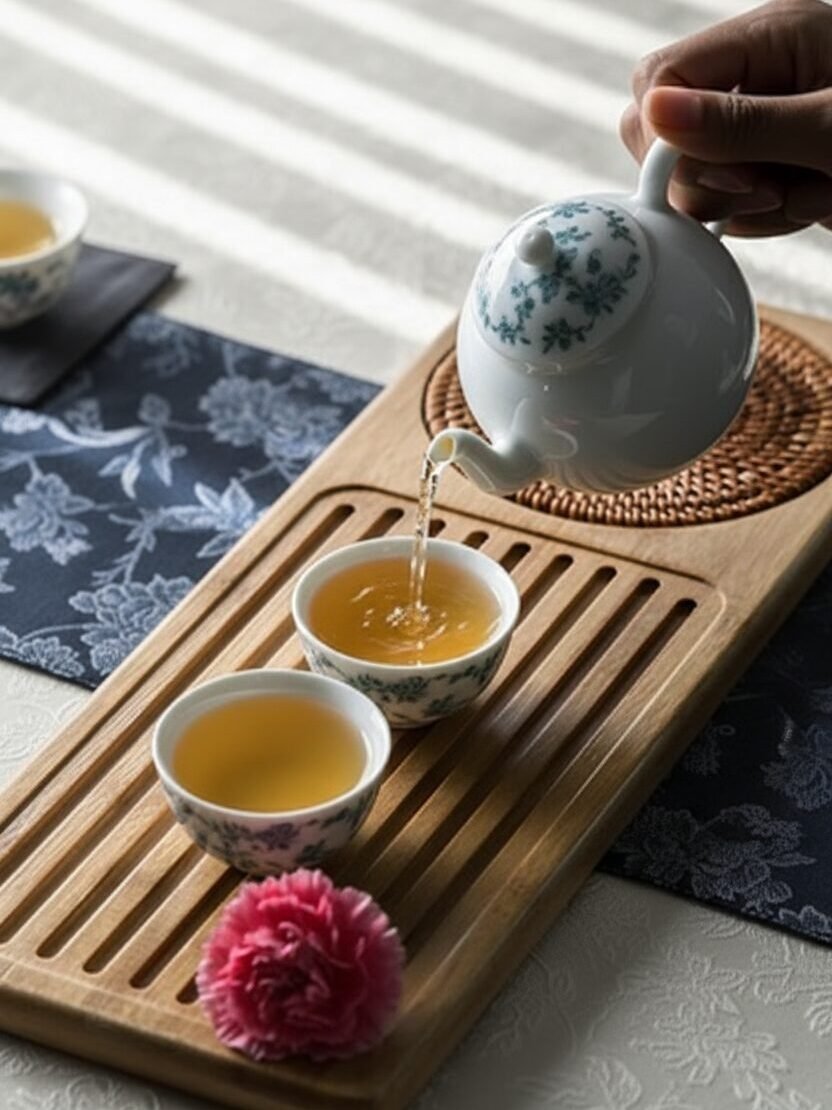
Dessert-inspired teas blend sweet flavors with classic tea bases for a guilt-free treat that satisfies cravings without added sugar – discover these decadent brews that taste like your favorite desserts!
Chocolate Mint Oolong
Chocolate Mint Oolong offers tea lovers a perfect blend of rich cocoa notes and cool mint freshness. The natural sweetness comes from the oolong base, which sits between black and green tea in terms of oxidation. Many fans of sweet tea find this variety satisfies their cravings without needing extra sugar.
The brewing process brings out different flavor notes depending on water temperature and steep time. At lower temperatures, the mint flavors shine through first, followed by a gentle chocolate finish.
Hotter water draws out more of the cocoa elements, creating a dessert-like experience in your cup. This naturally sweet tea pairs well with light cookies or can stand alone as an after-dinner treat.
The natural oils in the oolong leaves allow for multiple infusions, making this premium tea a good value despite its price point.
Strawberry Truffle Puerh
Moving from the minty chocolate notes of Oolong, we find another dessert-inspired delight in Strawberry Truffle Puerh. This unique blend combines aged puerh tea with sweet strawberry flavors and rich chocolate notes to create a truly decadent experience.
The natural earthy depth of puerh tea serves as a perfect base for the fruity sweetness, making it a favorite among those who enjoy naturally sweet tea without added sugar.
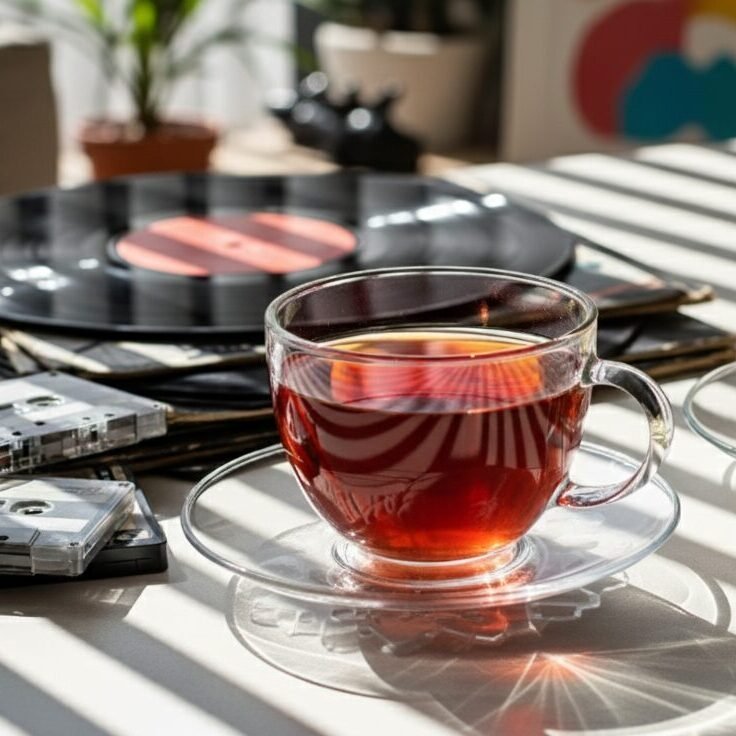
Tea lovers appreciate how the strawberry essence brightens the deep, complex flavors of the puerh. The chocolate undertones add a velvety finish that transforms this black tea variety into something special for afternoon sipping or after-dinner treats.
Many fans report that this blend satisfies sweet cravings while still delivering the health benefits of traditional puerh. Its natural sweetness pairs well with both hot brewing methods and as an iced tea during warmer months.
Caramel Snickerdoodle Herbal Tea
While Strawberry Truffle Puerh offers fruity dessert notes, Caramel Snickerdoodle Herbal Tea brings the comfort of fresh-baked cookies to your cup. This caffeine-free blend combines cinnamon, vanilla, and caramel flavors to create a sweet treat without sugar.
Many fans of naturally sweet tea enjoy this option as an evening dessert replacement. The warm spice notes pair well with milk for an extra creamy texture that enhances the natural sweetness.
Unlike black tea or oolong varieties, this herbal infusion can be enjoyed any time of day without worrying about caffeine effects.
The Whistling Kettle Lemon Souffle Tea
Tastes like lemon cake in a cup—sweet and creamy without added sugar or caffeine.
Dessert teas satisfy sweet cravings without the calorie guilt—this Lemon Soufflé blend combines honeybush and rooibos with a creamy citrus finish. Five reviewers describe it as genuinely dessert-like: smooth, sweet, and reminiscent of lemon cake without being tart or artificial.
⚠️ Skip this if you want bold, punchy flavor—this is intentionally mild and creamy. Use a heaping teaspoon if you prefer stronger taste.
Tips to Enhance the Sweetness of Tea
Tea sweetness can be boosted with simple kitchen tricks that transform even bitter brews. You’ll discover how to pair your favorite teas with natural sweeteners and complementary flavors for a perfect cup every time.
Adding natural sweeteners like honey or maple syrup
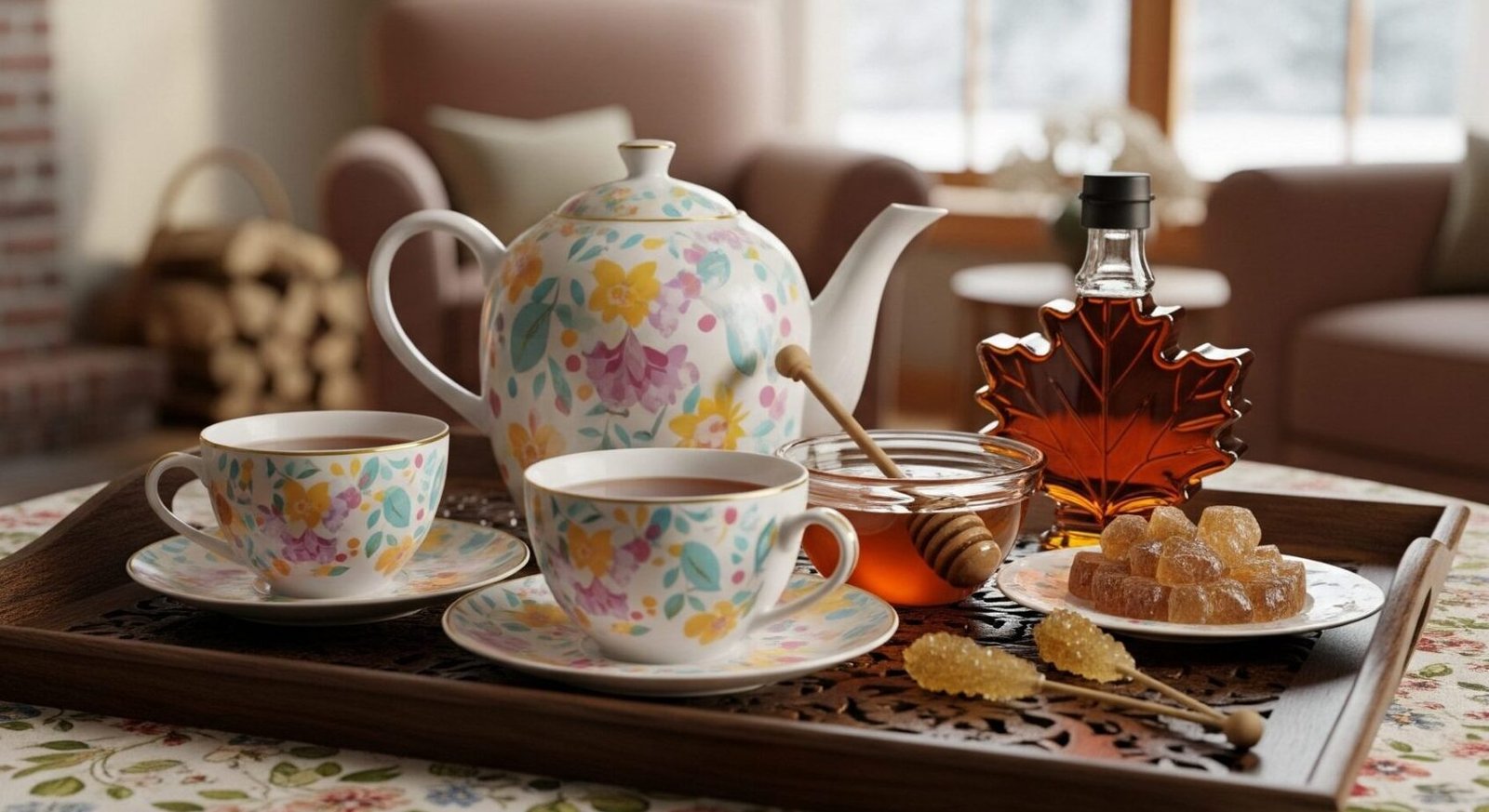
Honey adds a rich sweetness to your tea while bringing its own unique flavor profile. Unlike granulated sugar, honey contains trace nutrients and antioxidants that make it a healthier choice for your sweet tea cravings.
Many tea lovers prefer honey in black tea varieties, as its golden notes complement the strong flavors. For iced tea, try adding honey while the brew is still warm – this helps it dissolve completely before cooling.
Maple syrup offers another excellent option for naturally sweetening tea without refined sugar. This amber liquid brings a distinct woodsy sweetness that pairs beautifully with spiced teas and strong oolong varieties.
Coconut sugar works well too, dissolving easily and adding caramel-like notes to your cup. These natural sweeteners transform ordinary tea into something special while avoiding the health drawbacks of processed sugar.
Each tablespoon of these natural options adds character along with sweetness to your favorite brews.
Pairing with complementary flavors such as fruits or spices
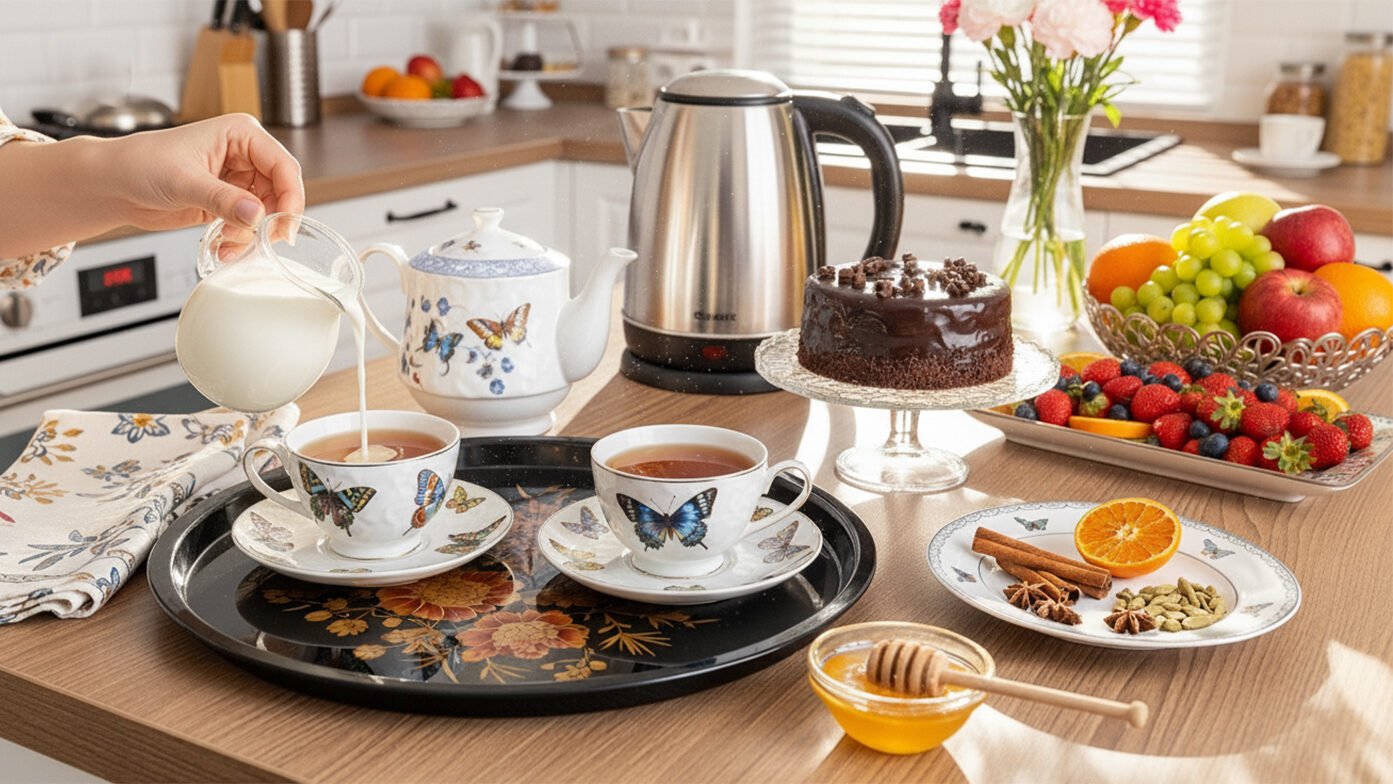
Pairing tea with fruits adds natural sweetness without sugar. Fresh berries like strawberries or blueberries bring bright notes to black tea, while citrus slices cut through the richness of oolong tea.
Spices create depth in your sweet tea experience – cinnamon sticks, star anise, or cardamom pods transform ordinary brews into complex treats. Fruit-infused teas match perfectly with desserts, especially cakes and dark chocolate, creating layered flavor profiles.
Some spiced sweet teas even complement spicy meat dishes, offering surprising culinary possibilities.
Tea flavor pairing works best when you balance sweetness with other taste elements. Mint leaves cool down sweet black tea, while ginger adds warmth to naturally sweet herbal blends.
The right fruit or spice can enhance the natural sweetness already present in your favorite tea variety.
OXO Brew Tea Infuser Basket
Large enough for cinnamon sticks and fruit slices, fine enough to keep particles out of your cup.
Adding cinnamon sticks, fresh ginger, or fruit slices to your brew infuses natural sweetness without processed sugar. This OXO infuser basket gives ingredients room to expand—14 reviewers praise its versatile fit across mugs, mason jars, and teapots, while the fine mesh (15 mentions) keeps particles out of your cup.
⚠️ Skip this if you need something portable—it doesn't fold or collapse, so it's best for home brewing setups.
Conclusion

Sweet teas offer a world of flavor without added sugar. From fruity rooibos to rich chocolate mint oolong, these drinks satisfy sweet cravings naturally. You can boost any tea’s sweetness with a drop of honey or fresh fruit slices.
Exploring different sweet tea varieties opens up new taste experiences for both casual sippers and devoted tea fans. Whether you prefer herbal blends or classic black teas, there’s a sweet option waiting to delight your taste buds.
FAQs
1. What makes certain teas naturally sweet?
Some teas contain natural sugars that give them a sweet flavor without added sweeteners. Oolong tea often has natural sweetness due to its partial oxidation process. The growing region, harvesting time, and processing methods all affect how sweet a tea tastes naturally.
2. Is black tea considered a sweet tea?
While a standard, plain black tea is typically not sweet on its own, there are several varieties that have a natural sweetness. For example, Osmanthus Black Tea has a honey-like taste from the added flowers, and Assam Milk Tea has a naturally sweet, malty profile. So, while you wouldn’t consider all black teas sweet, certain types definitely are without needing any sugar.
3. Which teas taste sweet without adding sugar?
The article highlights several types. The most prominent naturally sweet herbal teas are Rooibos and Honeybush, which have a smooth, gentle sweetness. Additionally, specific varieties from other categories are also naturally sweet without sugar: Osmanthus Black Tea (honey-like), Jasmine Green Tea (floral) and Genmaicha (nutty/earthy).
4. How can I make sweet iced tea healthier?
Use naturally sweet tea varieties as your base instead of adding lots of sugar. Try brewing oolong tea with a touch of honey, then cooling it for a refreshing iced tea. You can also add fresh fruit to your pitcher for natural sweetness that enhances the tea’s flavor.
References
- https://artfultea.com/blogs/101/types-of-tea-a-comprehensive-guide?srsltid=AfmBOorh83UgCXs3D8gg1IwSq7Ag2sHjNr6nlJ8IERUiPEbZKoGFx-lw
- https://pmc.ncbi.nlm.nih.gov/articles/PMC7231271/
- https://artfultea.com/blogs/tea-wisdom/best-black-teas?srsltid=AfmBOopijmVkTEPGOOFTqVfi57tSIjWfs_MBvYKNVaqrbIW4fQ0aEVjU
- https://www.teacurious.com/guide-to-taiwanese-tea?srsltid=AfmBOooYA3_VsZ2grTxOzvJZrtIk7LHA6Ci8KtHALQAX4NTfoYK4iyBv
- https://artfultea.com/blogs/tea-wisdom/japanese-tea?srsltid=AfmBOorb6VtG7Q4IJ3Pc2c6SA86gAR5nj35u0bVITPg9QzzfCe7se38F
- https://www.paperandtea.com/blogs/journal/our-guide-to-herbaltea (2024-04-18)
- https://sistateas.com/products/choc-mint-oolong?srsltid=AfmBOop3iJTq_rMtOrWGfjiNOpjLo_YTOx_qzf019AT6MvXiuK2-YwI9
- https://www.plumdeluxe.com/products/strawberry-truffle-puerh-tea?srsltid=AfmBOorMiD8RaPwA_JfaHW26s6G2vkovyo5kyYFKg-yObgT8Gmo8EBgs
- https://www.plumdeluxe.com/products/caramel-snickerdoodle-herbal-dessert-tea?srsltid=AfmBOop7UOJglTQa3R9mRempu0FgUuQjGfFDTH3DfuM_fUBouuJwuyHs
- https://www.firebellytea.com/blogs/all/sugar-free-sweet-iced-tea?srsltid=AfmBOorcLr986hP3lISNP06CVNuwO3dyw87ddC0gBZECu3dMCPeBmek0
- https://twinings.co.uk/blogs/news/food-pairing-with-tea
- https://pmc.ncbi.nlm.nih.gov/articles/PMC9829690/





